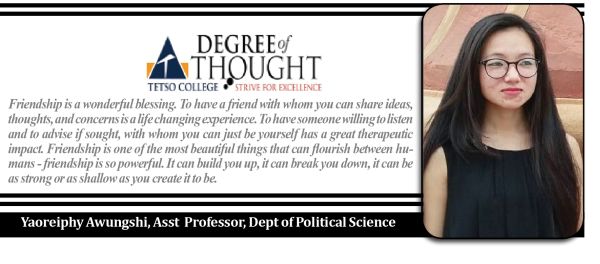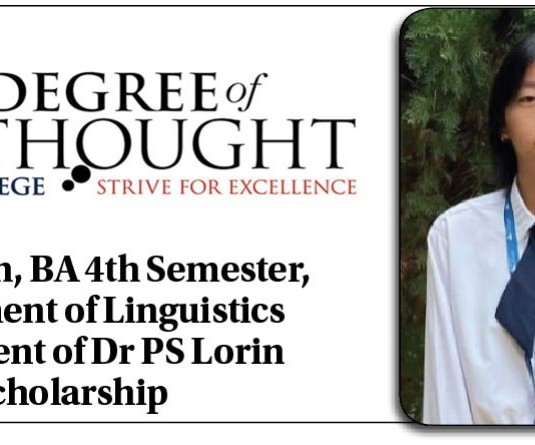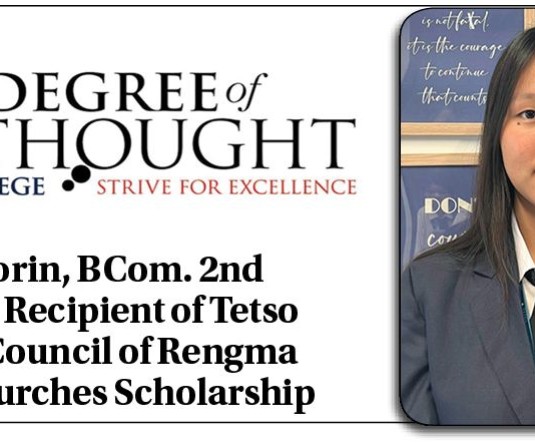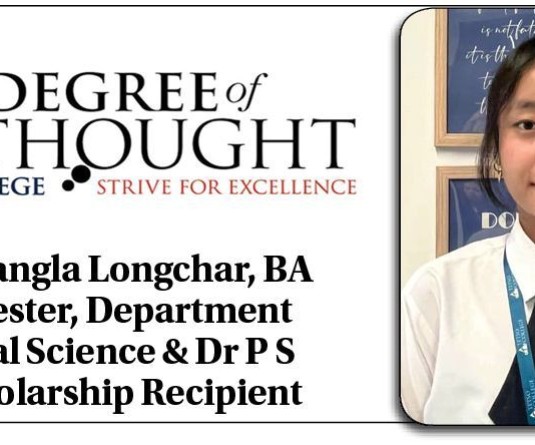Blessings Of Friendship

Yaoreiphy Awungshi, Asst Professor, Dept of Political Science
“Don’t walk in front of me… I may not follow
Don’t walk behind me… I may not lead
Walk beside me… just be my friend”
- Albert Camus
You have probably met and known many different people in your life. Most of them may simply be acquaintances, while others you might consider friends. Sometimes, this friendship is built over time; sometimes this bond is developed with brief conversation over coffee or tea etc. Of these, there may be only a few that you would consider close friends. Then, perhaps, there is that one or more person who is as close to you as a brother or sister or perhaps, as the Bible says, “a friend that sticks closer than a brother”, someone in whom you can confide and trust, and with whom you can share your thoughts, hopes and dreams. A friend who is there not only through the good times, but also the bad—through thick and thin—someone who won’t desert you when the going gets tough.
A true friendship that stands the test of trials and time is rare. Friends may come and go, but to have a lifelong, close personal friendship is truly a great blessing.
The story of Jonathan and David in the Bible is the story of one such friendship. They shared much in common. There were also things that could have easily destroyed their bond, but instead, they made it stronger.
Jonathan—a Prince of Israel, son of Saul, destined to rule Israel. He was a soldier, who fears the Lord, a man of courage, strength and integrity respected by the men he led. On the other hand David was the youngest son of Jesse, a bright-eyed shepherd boy who rescued his father’s sheep from a predator – a lion and a bear- literally grabbing hold of them and slaying them. Above all these feats, he also plays the harp, which made him known as the one “who is cunning in playing and a mighty valiant man, and a man of war, and prudent in matters, and a comely person”.
It was David’s ability to play the harp that first gave him favor with Saul. The soothing music that David skillfully played refreshed and calmed Saul’s troubled spirit. This moved the king to bestow upon him the great honor of being his armor bearer. Eventually, through his marriage to the king’s daughter, Michal, David became the Prince and brother-in-law of Jonathan. Yet this favor and honor in Saul’s sight was not destined to last. As David grew in stature and respect among the army, and the people of Israel, Saul’s love and favor turned into bitterness, resentment and hate. Saul became determined to murder David, since he knew that David would replace him on the throne. And Jonathan would never be king.
A single great event signaled both the beginning of Jonathan and David’s friendship and their falling from love and favor in Saul’s eyes- David’s defeat of the giant Goliath. David’s courage and bravery that day affected Jonathan deeply; he was moved to love him as much as his own life. He realized that they shared much in common in the areas of courage, bravery, strength, loyalty, trust and faith in God. From that day on, they were best of friends. Jonathan was moved to the point of giving David some of his treasured items: his robe, sword, bow and belt, and his armor.
Jonathan and David’s bond was so strong that they promised to never let anything come between them. Yet, Saul, upon hearing the people praise David in signing, “Saul has slain his thousands and David his ten thousands,” sought to kill David that day forward.
However, Jonathan’s love for his friend only grew. Many times, he interceded for David, warning him that his father was seeking to take his life. He risked his life by travelling a great distance to see David in hiding; understanding that he must decrease while David increased, he pledged to stand loyally beside him.
It would have been easy for Jonathan to go along with his father’s plotting, giving in to carnal nature and lust for power. But he showed great loyalty not only to David, but also to God and his will, and also to his father, preventing him from committing a terrible murder.
Yet, David also showed great loyalty to Saul and Jonathan. As many times as Jonathan and David were alone, it would have been very easy for David to give in to his human nature and kill a potential rival. Yet, David well remembered the covenant made with his best friend, recalling the words Jonathan spoke: “And you shall not only while yet I live show me the kindness of the Lord, that I die not: But also you shall not cut off your kindness from my house forever: no, not when the Lord has cut off the enemies of David everyone from the face of the earth.”
Much can be learned from the friendship of Jonathan and David. Each had accomplished great feats, relying on God for victory. They were zealous, courageous, humble, and so much more. Above all, they were loyal to one another.
They could have been enemies and rivals, yet they set aside jealousy, resentment, and lust for power; choosing instead to become the closest of friends. They knew how and when to laugh together, cry and show their emotions together, sharing hopes and dreams, thereby cementing their friendship forever. They were real men, able to show the true, proper and right love of a brotherly friendship, willing to lay down their lives for one another. Jonathan and David’s friendship is a lasting legacy of a relationship we share with another individual person, with ourselves and with God.
We can develop that kind of friendship with all others of like mind, who share similar goals, values, hopes and dreams. We should be grateful for the friendship we share with close friends.
Degree of Thought is a weekly community column initiated by Tetso College in partnership with The Morung Express. Degree of Thought will delve into the social, cultural, political and educational issues around us. The views expressed here do not reflect the opinion of the institution. Tetso College is a NAAC Accredited UGC recognised Commerce and Arts College. The editors are Dr Hewasa Lorin, Dr. Aniruddha Babar, Dr. Pfokrelo Kapesa, Webei Tsühah, Meren and Kvulo Lorin. For feedback or comments please email: dot@tetsocollege.org.






